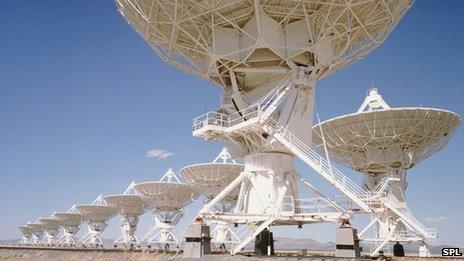Very Large Array telescope in public call for new name
- Published
- comments

Built in the 1970s, the VLA has been undergoing a refit over the past 10 years
One of the world's most famous radio telescope facilities needs a new name - and ideas are wanted.
The Very Large Array (VLA) is a bank of radio telescopes in New Mexico, US, and has appeared in a number of films including Contact and Independence Day.
The array has been undergoing a radical upgrade of its electronics since 2001.
To celebrate the project's finish, the observatory that runs the array wants to rename it - and is asking the public to submit ideas.
The contest, found at namethearray.org, external, is open until 1 December and the winner will be announced at the American Astronomical Society conference in January.
The VLA was constructed in the 1970s, and much of the electronics that collect and process the radio signals from its 27 gigantic antennas date from that era.
The array has been used for more than three decades to tease out details of far-flung galaxies, supernovas and black holes - when not appearing in films.
The National Radio Astronomy Observatory (NRAO) that runs the facility has for a decade been fitting it with state-of-the-art digital electronics, a new central computer, and high-speed transmission lines to carry the data that the 25m, 200-tonne dishes gather.
The updated system should be 10 times more sensitive to the faint radio hum from the cosmos.
The astronomy community has a long history of descriptive yet fairly unimaginative names - including the VLA itself, the Very Large Telescope, external in Chile, and the yet-to-be-built European Extremely Large Telescope, external (the design for which was chosen over the alternative Overwhelmingly Large Telescope, external).
Now, the NRAO wants to open up the choice to the public's creativity.
"Though the giant dish antennas, the unique machines that move them across the desert, and the buildings on New Mexico's Plains of San Agustin may appear much the same, the VLA truly has become a new and different facility," said NRAO director Fred Lo.
"We want a name that reflects this dramatically new status. The new name should clearly reflect the VLA's leading role in the future of astronomy, while honouring its multitude of past achievements."
By way of warning, the Science and Environment desk's entry will be the "Unfeasibly Large Telescopes", so that one is taken.
Would you like to enter the contest to rename the VLA? Visit namethearray.org, external and also put your entry below for others to see.
- Published14 February 2011